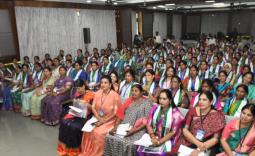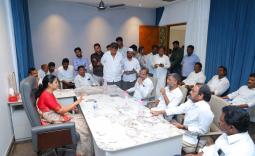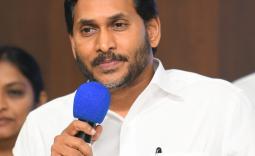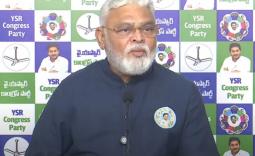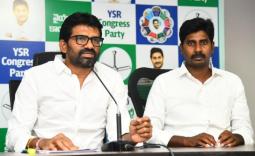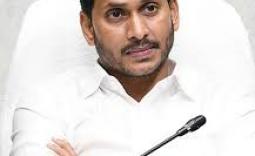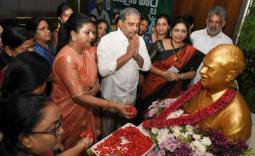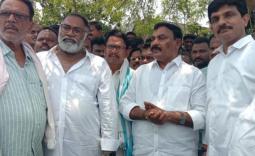YSRCP flays coalition’s vindictive politics CAG report exposes AP’s alarming fiscal crisis: Buggana
CAG report exposes AP’s alarming fiscal crisis: Buggana Naidu govt fails tenant farmers
Naidu govt fails tenant farmers Naidu ruining YS Jagan’s reforms in education
Naidu ruining YS Jagan’s reforms in education YS Jagan mourns drowning of five children in YSR district
YS Jagan mourns drowning of five children in YSR district Coalition govt’s neglect drives women to suicide
Coalition govt’s neglect drives women to suicide YSRCP demands justice for Bapatla’s struggling farmers
YSRCP demands justice for Bapatla’s struggling farmers YSRCP slams Naidu for neglecting Vijayawada’s development
YSRCP slams Naidu for neglecting Vijayawada’s development YS Jagan consoles parents of Martyred Murali Naik
YS Jagan consoles parents of Martyred Murali Naik YS Jagan expresses grief over deaths in road mishap
YS Jagan expresses grief over deaths in road mishap
CAG report exposes AP’s alarming fiscal crisis: Buggana
15 May 2025 5:22 PM

Tadepalli, May 15: Former Finance Minister Buggana Rajendranath sharply criticized the TDP coalition government citing the alarming revelations in the 2024-25 provisional accounts of AP published by CAG.
In a statement released, Buggana Rajendranath, stated that the provisional numbers bring to light the extent of financial mismanagement and lack of fiscal discipline under the Chief Minister N. Chandrababu Naidu's leadership.
According to Buggana, the CAG data indicates that the state has fallen into a cycle of mounting debt and economic stagnation, with large-scale borrowings being undertaken without any corresponding development on the ground.
He pointed out that the revenue expenditure for 2024–25 was as high as Rs. 2,25,889 crores despite the fact that, there were no major implementation of welfare projects during that year, this quite surely indicates expenditure profligacy.
Despite heavy borrowing, capital expenditure had dropped by Rs. 4,153 crore compared to the previous year, contradicting the Chief Minister’s claims that loans were being utilized to create durable public assets.
Referring to the CAG figures, Buggana noted that revenue receipts had declined from Rs. 1,73,767 crore in 2023–24 to Rs. 1,68,443 crore in 2024–25. State’s own revenues witnessed a very low year-on-year growth of only 3.08%, and non-tax revenue saw a reduction of Rs. 640 crore. During the YSRCP regime 2019-24, despite overwhelming odds that had resulted from the Covid-19 outbreak the State’s own tax revenues grew at a CAGR of 10.04%. Had that been the growth in FY 25 as well, the State’s own revenues would have touched Rs. 1,02,727 crores. If we take this figure into consideration, then the loss to the State exchequer on account of lower own revenues during FY 25 owing to myopic policies of the present Government is Rs. 6,500 crores.
Central grants, he said, had also dropped sharply in FY 2024-25 by Rs. 14,566 crore—from Rs. 34,702 crore to Rs. 20,136 crore. Mr. Buggana said that this demonstrates a picture contrary to the TDP’s allegations that the State Government during YSRCP regime did not utilize the Central Government’s schemes appropriately.
He emphasized that these were not just statistical changes, but serious indicators of poor planning and lack of economic foresight. The decline in sales tax by Rs. 1,053 crore and a drop of Rs. 705 crore in revenue from stamps and registration, he said, pointed to weakened public spending and a slowdown in the state’s economy.
Buggana also drew attention to a reduction in spending on critical social sectors like education, health, nutrition, and welfare, which had collectively seen a cut of Rs. 3,945 crore. He said this revealed the government’s neglect of public welfare, even after making grand promises under the so-called ‘Super Six’ schemes. Further, crucial Government programmes such the Aarogyasri have lost their effectiveness owing to the lack of present Government’s commitment towards them.
He further stated that the current government had failed to show any tangible development despite the massive borrowings. He mentioned that off-budget debts were on the rise. He further remarked that, in an unprecedented manner, the State Government is resorting to off-budget borrowings that very severely violate the Constitutional framework.
Buggana accused the TDP government of relying on inflated figures and misleading narratives, rather than addressing the underlying financial crisis. He remarked that what was being portrayed as growth was in reality a growing burden, and what was called development was merely a debt-driven illusion. Buggana also said that, the enormous attention of the present Government to the development of capital city, is very evidently depriving the other 25 districts of their fair share of development.
He called for transparency and accountability, demanding that the government disclose the full extent of its borrowings and their utilization. The public, he said, had every right to know why the debt burden was increasing while development remained absent.
Buggana cautioned the government to return to a path of fiscal responsibility, openness, and people-focused budgeting before the financial damage became irreversible.






